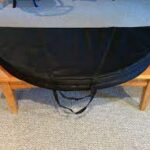I am sure you would have heard comments like, ‘Money management is much more important than the selection criteria’, ‘I play more tournaments then cash games’, ‘I don’t have enough money’, etc.Following on from this, we have common sense explanations why this is and why it is not. Even if you eliminate the conceived tournament from this equation, there will still be other factors you need to weigh up.
Essentially, money management (or bankroll management) is the plan of how you will ensure you have sufficient bankroll to ride out a run of bad cards or perhaps a string of unprofitable sessions. As well as the approaches you implement to entering and leaving a tournament, there are two additional considerations:
- The amount of blinds you sit down in front of
- The time allowed to play each hand
While you go through each of the above, you have other considerations too:
- Your tolerance for risk
- Your stack size
While I am not going to comment on the particulars of any particular play (I’m sure you can imagine where I would fit in with most of the suggestions above), the work will be useful if you want to improve your results.
You have to take a lot more than just observing a table and deciding what your targets are. You will need to have a sound strategy and be able to make the required moves when the time is right.
The first ten to fifteen hands of a poker session are usually spent playing at a lower level of buy-in tournaments. Therefore, you should consider using a bankroll management structure as you read these cards. While it may vary slightly on different parts of the world, the general Guideline Communityitational structure is something you want to employ.
Planning a Thorough Poker Session
That is, once you know how your system is going to operate, you need to take a plan to actually play. How much money you have should be given specific priority. Money management is only useful if you can actually play with the level of buy-in you have available.
You, of course want to be in command of your bankroll and have enough riding on each session you decide to play. Ideally, you want to test the waters when you have at least a hundred buy-ins riding on the session.
Bankroll Management Test
You can now determine if you need to take certain actions and/or if those actions are appropriate or not for a particular game. Or, you can just be conservative and plan to take the best decisions you can with your available time.
For example, if you wait to play until you have 300 or 400 buy-ins, you will be anxious if you don’t have the 200+ buy-ins needed, but will be overwhelmed if you do.
Joe Cada said it best, “Call me changed, I don’t really know what the f*ck I’m doing
Joe Cada said it best, “Call me changed, I don’t really know what the f*ck I’m doing.” That was a quote from the Horse to have, which was a movie with Matt Damon and Edward Norton. Not that the movie itself was terrible, but the character of Matt Damon does not exist in real life. So, we had to make a fake Matt Damon and give him some of our money.
This may be a good advice, but you could give yourself a big disadvantage by going for too big a game and then worrying that you will not have enough money to play unless you doubling up. Everyone knows that poker is about balance and having enough loaded money is always the best way to balance your game.
nonetheless, in these situations it is important to recognize that the game could actually be against you, even though you have neighbours it’s not going to be easy for you to beat them. Poker always calls for patience.
Being patient is where the big bucks are made.
So, if you are wondering “how to win consistently at poker” the answer is simple, you have to practise and practise and practise… a lot!
Download the information. Read it over, memorize it and then act on it.
So many players stop improving their game after they start to play on a regular basis, they start to worry that they are going to start losing money and quit. upright and tight play is the way forward as poker is a game of practise and common sense and anyone can improve their strategy.
I hope you do!

